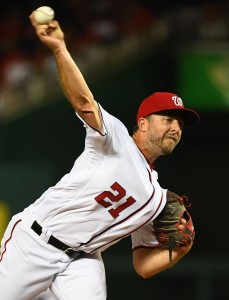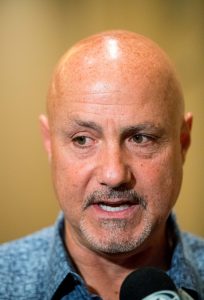The Nationals have designated left-hander Enny Romero for assignment, as per a team announcement. In corresponding moves, the club has selected the contract of catcher Jhonatan Solano from Triple-A and also called up utilityman Matt Reynolds, while catcher Miguel Montero has been placed on the paternity list.
Romero posted a 3.56 ERA, 10.5 K/9, and 2.83 K/BB rate over 55 2/3 innings out of Washington’s bullpen last season, with those solid results powered by a fastball that averaged 98 mph. He did allow runs in both of his outings so far in 2018, however, which seems to have made him the odd man out of the eight-man Nats pen, especially since the team needed some extra bench depth with Adam Eaton hampered by a minor ankle issue. (Manager Dave Martinez told the Washington Post’s Jorge Castillo and other reporters that Eaton is available today and is expected to start tomorrow, quelling fears about Eaton’s status.)
Reynolds was a second-round pick for the Mets in the 2012 draft, though after 226 PA (and a .228/.300/.351 slash line) for the team in 2016-17, New York dealt Reynolds to Washington last February after designating him for assignment. Reynolds has spent the bulk of his pro career as a shortstop, though he has also seen plenty of action as a second baseman, third baseman, and left fielder. The 27-year-old has hit .279/.346/.396 over 2152 career plate appearances in the minors.
Solano’s stint in the big leagues may be a short one while Montero is temporarily absent, though appearing in a game would mark Solano’s first MLB action since 2015. Solano played in 43 games for the Nationals and Marlins over the 2012, 2013, and 2015 seasons, and the 32-year-old has since played for the Nats’ Triple-A affiliate.


